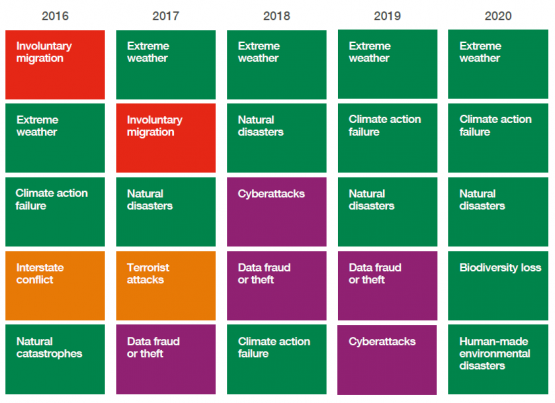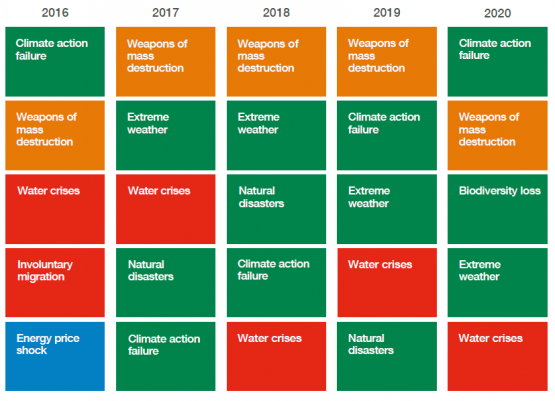BUSINESS NEWS - Every year the World Economic Forum puts out The Global Risks Report, which shows what 750 global experts and decision makers rate as the world’s most pressing challenges over the coming decade.
In 2020, for the first time ever, the top five risks identified by this group in terms of how likely they are to occur are all environmental.
As the table below shows, environmental risks have been prominent for some time. However, they now completely dominate the list.
Top five global risks in terms of likelihood
Source: World Economic Forum Global Risks Report 2020
In addition, the report identifies three environmental issues among the top five risks that could have the biggest impact if they are not addressed. The biggest risk the world faces, they believe, is that we fail to take action on climate change.
Top five global risks in terms of impact
Source: World Economic Forum Global Risks Report 2020
As the report states:
“Climate change is striking harder and more rapidly than many expected. The last five years are on track to be the warmest on record, natural disasters are becoming more intense and more frequent, and last year witnessed unprecedented extreme weather throughout the world. Alarmingly, global temperatures are on track to increase by at least 3°C towards the end of the century – twice what climate experts have warned is the limit to avoid the most severe economic, social and environmental consequences.”
Taking hold
It is no longer a case that governments and business are waking up to this reality. That has already happened. It is now universally accepted that action needs to be taken. The only disagreement is on its approach and scale.
Even though US President Donald Trump is a climate science denier, and his recent speech at the World Economic Forum in Davos criticised “prophets of doom and their predictions of the apocalypse”, he nevertheless promised some action on the environment. He committed the US to the One Trillion Trees initiative, and insisted that he wants clean air and water.
His critics would say that this is not anywhere near enough, but it still highlights how nobody can avoid recognising the pressing nature of environmental risks.
Fundamental shift
This is true in financial markets as well. In his recent annual letter to CEOs, Larry Fink – chair and CEO of BlackRock, the world’s largest asset manager – announced that his firm’s active funds will be exiting their positions in any company that generates more than 25% of its revenues from thermal coal production.
It will also be using the strength of its large shareholdings in many companies through its index funds to engage more intensely around improving climate disclosures and aligning business models with a transition to a low carbon economy.
“Climate change has become a defining factor in companies’ long-term prospects,” Fink noted. “Last September, when millions of people took to the streets to demand action on climate change, many of them emphasised the significant and lasting impact that it will have on economic growth and prosperity – a risk that markets to date have been slower to reflect.
“But awareness is rapidly changing, and I believe we are on the edge of a fundamental reshaping of finance,” he added.
BlackRock’s decision has been commended, but advocates argue that this was a position the firm had effectively been forced into adopting. As Just Share, a local non-profit shareholder activism and responsible investment organisation, noted: “It was impossible for BlackRock to take any other position and maintain credibility as a responsible investor.”
Left behind
Investors cannot ignore this. If asset managers like BlackRock have had to adopt the policy that they will no longer be investing in certain industries, that has material implications for the share prices of companies in those sectors.
Equally, they need to be aware of how thinking in financial markets is shifting. It is now becoming untenable for asset managers to value companies and opportunities on financial metrics alone.
“The evidence on climate risk is compelling investors to reassess core assumptions about modern finance,” Fink accepted in his letter.
“Research from a wide range of organisations – including the UN’s Intergovernmental Panel on Climate Change, the BlackRock Investment Institute, and many others, including new studies from McKinsey on the socioeconomic implications of physical climate risk – is deepening our understanding of how climate risk will impact both our physical world and the global system that finances economic growth.”
The essence of this is that the environmental risks identified by the World Economic Forum are no longer merely external issues for companies to consider. They are going to have a real impact on the way their businesses operate. This means they are real matters for investors to contemplate as well.
“Investors are increasingly reckoning with these questions and recognising that climate risk is investment risk,” wrote Fink. “Indeed, climate change is almost invariably the top issue that clients around the world raise with BlackRock.
“From Europe to Australia, South America to China, Florida to Oregon, investors are asking how they should modify their portfolios. They are seeking to understand both the physical risks associated with climate change as well as the ways that climate policy will impact prices, costs, and demand across the entire economy.”


















